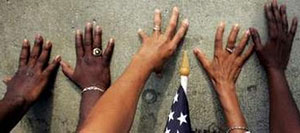 |
 |
 |
 Travel & Outdoors | May 2006 Travel & Outdoors | May 2006  
Worried Hurricanes May Spoil Your Vacation Plans?
 Judy Wiley - Fort Worth Star-Telegram Judy Wiley - Fort Worth Star-Telegram


| | Ninth Ward residents place their hands on a new levee wall as they say a prayer in memory of those who have lost their lives during Hurricane Katrina in New Orleans, Louisiana, May 29, 2006. Many lost their lives due to severe levee failures throughout the metro area. (Reuters/Sean Gardner) |
Rhonda Mandel lived through Hurricane Katrina's fury in a Marriott Hotel ballroom, a makeshift shelter with a frightening view of the looters and floodwaters that poured through the streets of New Orleans after the storm.

A visitor from Fort Myers, Fla., she'd intended to fly home on Aug. 28, the day before the storm hit. But she was stranded when Delta Airlines canceled its flights for that Sunday.

Plenty of U.S. travelers shared Mandel's experience last year, when hurricanes tore through Cancun and Cozumel, as well as New Orleans. The season starts up again Thursday and continues through Nov. 30.

You can take steps to make sure you aren't heading for a catastrophe, hang onto most of your vacation investment and stay safe if the worst happens.

Insurance wouldn't have solved Mandel's problem, but it can save you money if you decide to change plans because of weather. Make sure the policy covers hurricanes - most kinds don't, says Christy Sazama of Worry-Free Vacations.

If you don't feel comfortable reading the fine print, use a travel agent, Sazama says. "I can't stress enough to make sure people understand they know what they're buying before they get it."

Some companies offer a pre-travel waiver, whose price depends on the destination (Funjet Vacations, for example, offers a waiver for $69 per adult to Mexico). The waivers permit cancellation for any reason; some require 48 hours' notice, while others take you up to the date of travel.

If you don't buy travel insurance, check with your carrier on its policy if you want to cancel.

If you're really worried, there's a more concrete solution: Book a trip to a less hurricane-prone destination. The western coast of Mexico is a little more popular these days, partly because not all carriers have resumed all service into Cancun and Cozumel, says Steve Cosgrove, owner of Dynamic Travel in Southlake, Texas.

"We've seen a lot more Puerto Vallarta and a lot more Cabo San Lucas, " he says.

So you have your insurance, and the latest hurricane is forming down south. Will it strike your destination? What are the chances? When should you make the decision?

All you can do is keep a close eye on the weather, says Gary Woodall, warning coordination meteorologist for the National Weather Service's Fort Worth forecast office.

Cosgrove says, "If it's a 10 percent chance, I'll probably take my chances. I'll probably keep the radio on - not go down there and be oblivious. I would keep track of it. If the news is showing people evacuating the island, I probably don't hop on a plane."

Sometimes, airlines and cruise lines make the decision for you, he says. On the other hand, travelers did make it into Mexico last year just before Hurricane Wilma struck, so ultimately the decision is yours.

In the meantime, monitor TV, radio and newspaper accounts, and check the National Hurricane Center's Web site, www.nhc.noaa.gov.

The service makes forecasts about specific hurricanes up to five days ahead and updates every six hours, says Frank Lepore, public affairs officer for the National Hurricane Center in Miami. A hurricane can change course, fizzle out or get stronger in a matter of a few days, so be vigilant.

"If you're going to a hurricane-prone part of the world, you need to start doing a little planning," Lepore says. "Call your hotel and find out if they'll allow you to stay there during a hurricane." They won't, in many cases, and you'll be forced to rely on the local government for shelter.

Mandel also suggests carrying a small emergency kit (flashlight, snacks, water) and renting a car when you travel at a potentially dangerous time and keeping it full of gas. That gives a traveler an option for getting away, and the full gas tank is a must when stations are shut down.

Sleeping on a cot in a shelter with 500 new best friends is not much fun, no matter how you cut it. Having gotten to safety - the first priority - the next thing on your agenda will be letting loved ones know you're OK, and then getting home.

Again, preparation is paramount. Bring a cellphone number for your travel agent, if possible, and phone numbers for any company you used for the trip, as well as the airline. None of that will do you much good until phones are working again, but you'll be ready when they are. | 
 | |
 |



